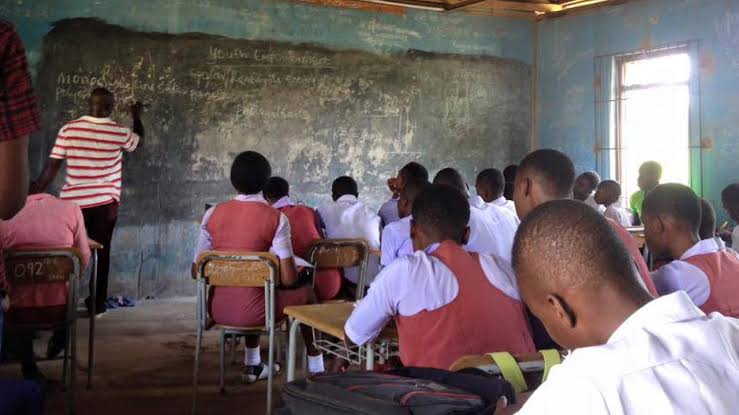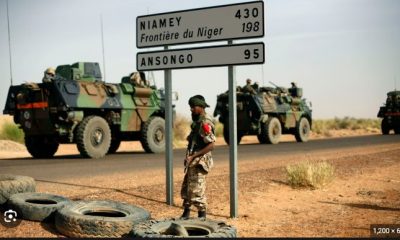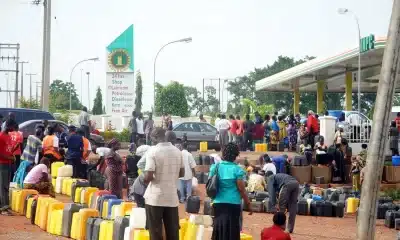Education
The Impact Of Fuel Scarcity, Rising School Fees On Nigerian Education

As the new academic session begins across Nigeria, parents are feeling the financial pinch more than ever, largely due to the recent spike in petrol prices.
This fuel crisis has triggered a ripple effect, intensifying the already heavy burden of educational expenses for families nationwide.
The rising cost of transportation, school materials, and tuition has significantly affected parents’ ability to manage their finances. Schools, faced with their own escalating operational expenses, have been forced to pass on these costs to families.
As a result, many parents are now grappling with the challenge of keeping their children in school amidst these mounting financial pressures.
In separate interviews with Naija News, both school administrations and parents have expressed concerns about these pressures.
The proprietress of Gracious Foundational School in Modakeke-Ife, Osun State, Nigeria, Tolulope Akinruli, sheds light on the current challenges faced by the Nigerian education system as fuel scarcity continues to exacerbate the already difficult financial strain on families.
She explored how these economic pressures have affected both public and private schools, as well as the long-term consequences for Nigeria’s future workforce.
Student Attendance Plummets Amid Rising Costs
As fuel prices soar, so do transportation expenses, leading many parents to withdraw their children from school. “The rising cost of fuel has made it increasingly difficult for families to afford school transportation,” Akinruli explains.
Many parents have no choice but to transfer their children to public schools or stop their education altogether. This alarming trend has caused a significant decline in school attendance, disproportionately affecting low-income families.
Financial Strain on Parents
For parents, the fuel crisis has meant more than just transportation difficulties. It has burdened their entire financial ecosystem, especially with the increasing school fees.
Akinruli notes, “Parents are forced to adjust their monthly budgets, often cutting down on essential needs like food and healthcare, just to meet the growing educational expenses.”
The situation has driven some parents to take up additional jobs, further straining family dynamics and well-being.
Preserving Educational Quality in Private Schools
Interestingly, while one might assume that rising fees would affect the quality of education, Akinruli clarifies that private schools have managed to maintain, and in some cases, improve their standards.
“In private schools, the increased fees allow for better facilities and salaries for teachers, who also face higher transportation costs. It motivates teachers to perform better, knowing their needs are being addressed.”
However, the story is not the same for public schools, where the impact of fuel scarcity is felt more acutely.
Akinruli observes that government schools are struggling with a decline in educational quality due to inadequate funding and a shortage of teaching staff.
Adapting to the Crisis: Alternative Transport and Challenges
Many students and families have been forced to find alternative means of transportation, such as carpooling or walking.
According to Akinruli, while some students have resorted to trekking long distances, the time lost in transit affects their overall school performance and well-being.
“One of the most common ways that students and their families have adapted to the fuel scarcity is by carpooling with other families or neighbours, and others have adapted to ‘legedize Benz’.
“However, coordinating schedules and finding reliable partners to carpool with can be a challenge, especially when considering the diverse schedules and commitments of different families and while trekking on the other consumes time,” Akinruli explained.
Rural Communities Hit Harder
The situation is even worse in rural areas, where fuel and resources are limited.
“Families in rural regions are finding it increasingly challenging to send their children to school due to the high cost of fuel and limited transportation options,” Akinruli said.
As a result, education is becoming less accessible to students in these remote locations, deepening the divide between urban and rural education.
Government Intervention: Is It Enough?
Despite the Nigerian government’s attempts to address the fuel crisis through policy reforms, Akinruli believes the measures have fallen short of their intended goals.
Akinruli said, “When it comes to fuel scarcity, the Nigerian government has implemented several policies in an attempt to address the issue and so the answer to this remains controversial.
“These have included efforts to increase domestic fuel production and refining capacity and measures to reduce fuel subsidies. However, the effectiveness of these policies has been mixed.
“The government don’t really have a say most especially in private schools as regards increase of school fees taxes increases. While there have been some improvements in fuel availability in certain regions, overall, the problem persists and continues to have a negative impact on the lives of many Nigerians and in the educational sector.”
How Are Schools Helping Families Cope
In response to the crisis, some schools have introduced financial aid programs such as scholarships and bursaries to ease the burden on struggling families.
“One common approach has been to provide financial assistance to families who are struggling to afford the increased fees. This may take the form of scholarships, bursaries, or other forms of financial aid, which can help to ensure that students are not forced to drop out of school due to financial constraints nor fuel scarcity,” Akinruli noted.
These initiatives are crucial in keeping students in school despite the ongoing economic challenges.
Private vs. Public Schools: Who Suffers More?
Private schools, with their larger budgets and adaptability, have been able to weather the storm more effectively than their public counterparts.
“Private schools have been less affected by the fuel scarcity compared to public schools because they have the financial means to adapt to the situation. Private schools often have larger budgets and greater flexibility to invest in alternative energy sources, such as solar panels or fuel-efficient vehicles.
“This enables them to continue operating without significant disruptions, whereas public schools may struggle to find the necessary resources to address the impact of fuel scarcity on transportation and heating costs,” Akinruli explained.
The Long-Term Effects on Nigeria’s Workforce
The current crisis could have far-reaching consequences for Nigeria’s education sector and, by extension, its future workforce.
“If these challenges persist, we may see a decline in the quality of education and a shortage of skilled workers in the future,” Akinruli warned.
The fuel scarcity and rising school fees threaten to widen the education gap, leaving many students without the tools they need to succeed in an increasingly competitive job market.
The Students’ Perspective: Struggling but Hopeful
Despite the many challenges, students are determined to persevere.
“They are facing financial challenges, transportation issues, and academic pressure as a result. However, students are resilient and hopeful for the future.
They are determined to overcome these obstacles and continue their education, despite the challenges they are facing,” Akinruli concluded.
It is this resilience and determination that give hope, even in the face of an uncertain future for education in Nigeria.
This multifaceted crisis has exposed the vulnerabilities of Nigeria’s education system, but it has also highlighted the resilience of its people—students, parents, and educators alike.
How the country addresses these challenges will shape the future of its education sector and, ultimately, the workforce that will drive the nation forward.
Similarly, the rise in fuel prices has significantly impacted daily operations at Mercy Olu School and Adon College, 8 oke-Alase Street off Araromi Abebi Ota, as discussed by Mr. Kenny Osas, a member of the Board of Education.
He explained that commuting costs for both staff and students have increased, causing a drop in student attendance, especially for those traveling long distances.
Around 30% of students have relocated due to high transportation costs, and parents are struggling with rising school fees, leading to more requests for payment plans or withdrawals.
“Around 30% of our students have relocated from the school environment due to the high cost of transportation,” Mr. Osas said.
He added that many parents are now struggling to afford the daily commute for their children, forcing tough decisions about school attendance.
Parents are increasingly voicing concerns about school fees, especially in light of rising living costs. “Many parents are reaching out to discuss payment plans or ask for more time to pay fees,” Mr. Osas explained.
The school has had to raise its fees to cover increasing operational costs, which has led to further withdrawals of students, as parents find it difficult to meet these demands.
With rising costs of electricity and fuel for generators, the school’s management has had to rework its budget.
“We’ve adopted a ‘scale of preference’ approach, focusing on the most critical needs to keep the school running,” Mr. Osas stated.
This means prioritizing essential expenses while putting non-urgent matters on hold, even if they are important to the school’s operations.
To accommodate the financial challenges, the school has made several adjustments. “We’ve reduced unnecessary spending, such as cutting down on electricity and fuel consumption,” Mr. Osas explained.
To support struggling families, the school has introduced flexible payment plans and discounts for families with multiple children enrolled.
Additionally, the school has reduced the number of uniforms required from three to two and allowed parents to purchase books outside of the school bookstore to cut costs.
Mr. Osas advised parents to communicate openly with the school and manage their finances carefully to navigate the difficult situation together. Despite budget constraints, the school aims to provide continuous, quality education to its students.
Navigating School Expenses in Tough Economic Times: Parent’s Perspective
Agwi Nosa Greener, a parent whose child attends Honeyland College in Lekki, shared her experience regarding the impact of current economic challenges on school-related costs.
While there hasn’t been a significant change in school fees compared to the previous term, an additional ₦10,000 has been introduced for lunch fees. “Other than that, everything else has stayed the same,” she noted.
However, unlike many other parents, the increase in transport costs has not been a major issue for Greener. “My child’s school is just a 5-minute walk from home, so we don’t feel the impact of the price hike,” she explained.
Still, the overall economic situation in the country has presented challenges. “The situation in the country is affecting everyone, so I wouldn’t say it has been easy,” she admitted.
Saving for her child’s future education has become more difficult, given the rising daily expenses. “It’s definitely been harder to save for my child’s future education, but we’re trying to manage the best we can.”
Like many Nigerian families, Greener has had to make sacrifices to meet school-related expenses. “I’ve had to cut back on some of my expenses just to make sure we can cover school costs,” she explained. “It hasn’t been easy, but it’s necessary to keep everything balanced.”
In terms of potential solutions, Greener suggested that schools could offer more flexible payment plans, allowing parents to pay fees in smaller installments over time.
She also highlighted the need for more government support or scholarships to alleviate the financial pressure on parents.
Additionally, she suggested that schools could help parents save on the cost of books. “Schools could allow students with younger siblings to reuse books that their older siblings used if it’s within one or two years, as the material wouldn’t change much,” she said.
This, she believes, could significantly reduce the financial burden on parents, especially given how expensive it is to purchase books at the start of every session.
Mrs. Osuji, another parent whose child attends Holy Trinity Nursery and Primary School, Lagos, shared her concerns regarding the rising costs of education. “The increase in fees compared to last term is quite alarming, I must say,” she remarked.
Despite the financial strain, Mrs. Osuji is committed to ensuring her child’s education. “The children have to be educated by all means, so I try to make sure of that even if I have to walk him to school myself sometimes,” she explained.
The current economic climate has made it challenging to maintain savings. “These days it’s even hard to save, but I believe when we get to that bridge in his education, we will cross it,” she stated optimistically.
To manage expenses, Mrs. Osuji has made cuts in her household budget, reducing unnecessary costs like her DStv subscription and avoiding impulse purchases of new clothes and shoes.
“I had to reduce expenses on things like the DStv subscription and buying new clothes or shoes on impulse,” she admitted.
Looking to the future, she hopes for a more balanced approach to school fees. “If the government can find a way to balance or reduce the school fees, and if the school authorities ensure that parents receive value for their payments when they see their children, then I believe everyone will be happy,” she concluded.
Speaking with yet another parent, Mr Stanley Dick, whose daughter attends Fifame Nursery and Primary School, Lagos State, he shared his thoughts on the rising costs of education and their impact on families.
He noted, “There has been an increase of ₦10,000 in the school fees, along with a rise in the cost of textbooks.”
Despite these changes, the hike in transport costs has not affected his daughter’s school commute.
“She schools very close to the house. It’s a walkable distance. This decision was deliberate to save time and resources,” he explained, adding that his daughter is only four years old, and he aims to avoid subjecting her to undue stress at such a young age.
When asked about saving for his child’s future education amid rising expenses, Stanley expressed concern. “Yes, due to the policies made by the current administration, the cost of living has become unbearable. What used to be a basic need has become a luxury. Everything has to be done strictly by budget and planning. The minimum wage can’t cover basic needs, so saving is impossible right now. We live day by day,” he shared.
To manage rising education costs, Stanley has made significant lifestyle changes. “Yes, spending in other areas has to be reduced, and every expense is now budgeted. We live and spend based on priorities, cutting out any form of extravagant lifestyle completely.”
He also offered potential solutions for parents facing similar challenges: “Schools should consider using reusable textbooks, parents should enroll their children in schools closer to home, and they should seek more affordable schooling options.”










